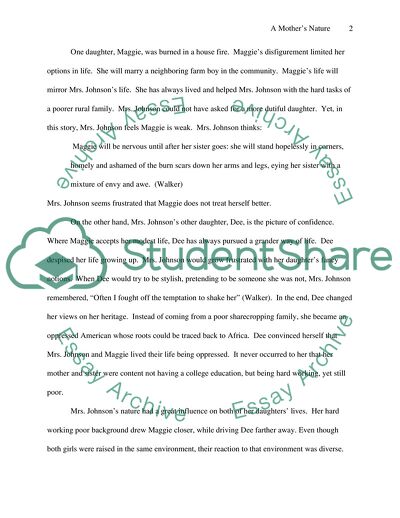
- Home
- Free Samples
- Premium Essays
- Editing Services
- Extra Tools
- Essay Writing Help
- About Us
- Studentshare
- Subjects
- Miscellaneous
- (TBD-need writer's advise)
(TBD-need writer's advise) - Essay Example

- Subject: Miscellaneous
- Type: Essay
- Level: Masters
- Pages: 4 (1000 words)
- Downloads: 0
- Author: qwaelchi
Extract of sample "(TBD-need writer's advise)"
A mother’s nature has an immense impact their child’s personality. In a perfect world, the mother and child relationship is mutually satisfying and enduring (Lezin, Rolleri, Bean, & Taylor). Many times the bond between mothers and children are not satisfying and enduring. The mother generally sets the tone toward a good relationship, but not always. Each child has their own individual personality. Some of the child’s traits are inherited, but some aspects of a child’s personality can be influenced by circumstance beyond the mother’s control.
Each example is different. In Alice Walker’s Everyday Use, a mother has two daughters that are polar opposites of each other. Mrs. Johnson raised her daughters in a poorer rural atmosphere. The story never really says what happened to Mr. Johnson, but it is clear he was not involved in his daughters’ raising. His lack of involvement could be to death or abandonment, writer never really tells that part of the story. Mrs. Johnson was literally a single mother for most of her daughter’s lives (Walker). Mrs. Johnson’s and her daughters live like many Americans.
Jan Hare and Lizbeth Gray report, “More than half of all children will spend some of their lives in a single-parent family” (Hare & Gray). One daughter, Maggie, was burned in a house fire. Maggie’s disfigurement limited her options in life. She will marry a neighboring farm boy in the community. Maggie’s life will mirror Mrs. Johnson’s life. She has always lived and helped Mrs. Johnson with the hard tasks of a poorer rural family. Mrs. Johnson could not have asked for a more dutiful daughter.
Yet, in this story, Mrs. Johnson feels Maggie is weak. Mrs. Johnson thinks: Maggie will be nervous until after her sister goes: she will stand hopelessly in corners, homely and ashamed of the burn scars down her arms and legs, eying her sister with a mixture of envy and awe. (Walker) On the other hand, Mrs.
...Download file to see next pages Read MoreCHECK THESE SAMPLES OF (TBD-need writer's advise)
The Mezquita Mosque
Young people who may be experiencing SOCIAL EMOTIONAL BEHAVIOURAL DIFFICULTIES where should schools focus
The Beliefs of Ecclesiaste, Qoheleth and Solomon
Egyptian Celebrities: Scientists, Writers, Politicians, and Actors
Torts problem question
Broadcast Media Experience with TBC Broadcasting Station Yvonne
English Language - Business Writing ( memmo and informal reports )
Six Writers in Search of Texts by Arndt

- TERMS & CONDITIONS
- PRIVACY POLICY
- COOKIES POLICY